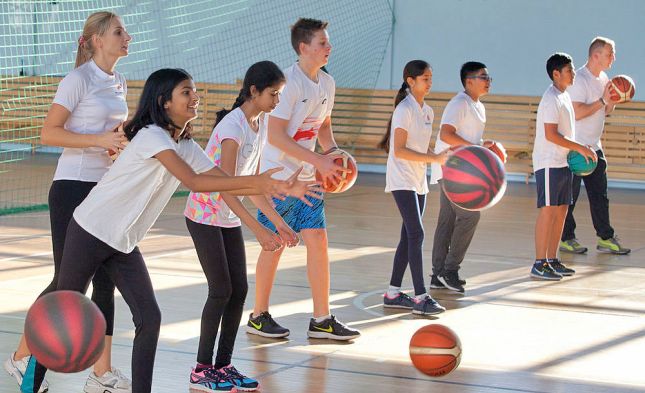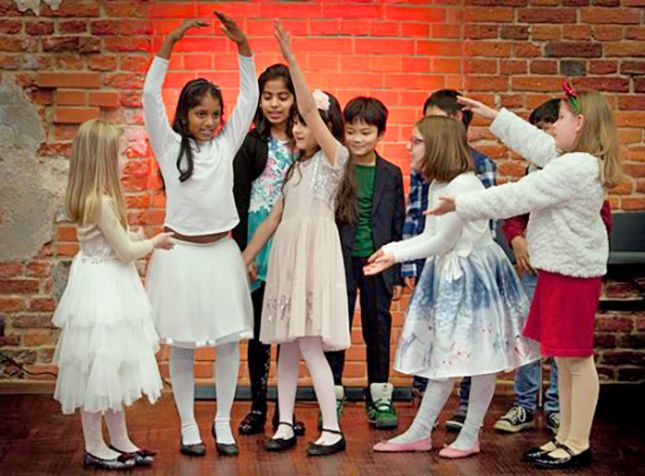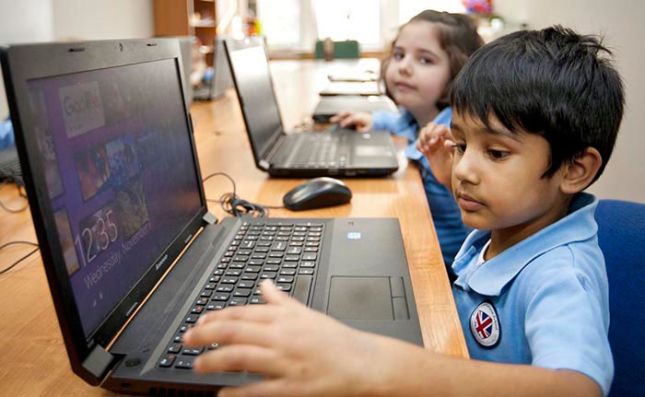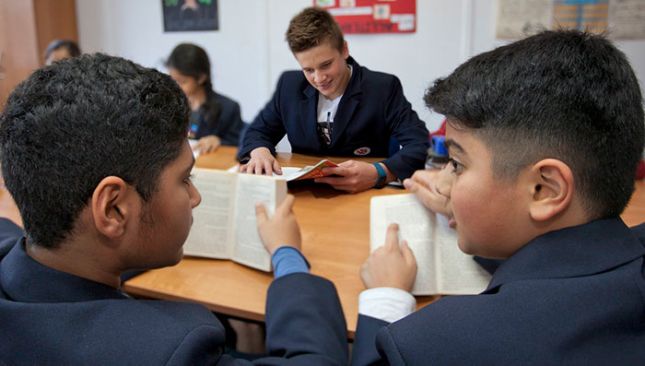On this page:
- School history
- Relationship with the University of Łódź
- Curriculum
- Languages
- Students
- Teachers
- Recruitment
- Achievements
- Difficulties/challenges
- Finances

Our Kids spoke with Magdalena Matz, chair of the board of the British International School of the University of Łódź.
School history
Our Kids: How was the school created?
Magdalena Matz: In 2011, a branch of a Wroclaw International School was established in Łódź. It operated for about two years. In May 2013, the owners suddenly told the parents that unfortunately they were withdrawing and closing the school. A problem arose for all students who attended the school, from kindergarten to high school. Most of them were foreign children for whom there was no option of going to a Polish school. The parents decided to turn for help to the mayor of Łódź, Ms. Hanna Zdanowska. She asked the University of Łódź to help in this matter, and the university undertook to create a school. In the two summer months of 2013, we completed the task, and the school started. We had only 44 students then. The school has been growing ever since.
Initially, we had problems with our building, and therefore for the last two years we couldn’t promote ourselves too much due to the lack of space, but this year we got a building from the city, which we will be renting from September 1st, although we probably won’t move there until November. It’s a building where a middle school was located, but as we know, middle schools have been gradually eliminated as part of the education reform.
The empty building was given to us, and we’re currently doing a major renovation there, adapting it to our needs. In November, we plan to move all of our programs to the new building, i.e., kindergarten, primary school, and high school. We need a lot of space because we offer education at 14 levels. The current school building is too small: there’s no gym, and we have to take children to the university sports facilities and swimming pool. We also don't have enough green area around.
Our Kids: And the new building? Is it also at the university campus?
Magdalena Matz: No, we have to move out of campus, and we’re a little sad because we enjoyed being here. But the new building is in the very centre of Łódź, with good public transportation access, surrounded by greenery and close to parks, which is very important for us, because our students spend a lot of time outdoors.

Relationship with the University of Łódź
Our Kids: Your school is closely related to the university, which is quite a rare arrangement. What is this relationship like and how does it benefit students?
Magdalena Matz: We have access to university sports grounds, university laboratories, and some of our teachers are also academic faculty of the University of Łódź. We have logistical support, for example, and the university infrastructure and resources at our disposal. In addition, a three-member supervisory board has just been appointed by the chancellor, which will supervise the quality and finances of our school, now that it grows so dynamically. But despite the fact that we’re affiliated with the university, we’re a separate company, financially independent from the university and a completely separate, self-financing institution.
Curriculum
Our Kids: Why do you implement the British curriculum?
Magdalena Matz: First of all, because of the current situation. We took over students who were taught according to the British curriculum and parents asked for a continuation. We have recently applied for accreditation to the IB Diploma Programme. I hope that starting in September 2020 we’ll be able to offer IB at the highest level.
Our Kids: And what is particularly valuable in the British curriculum compared to, for example, the Polish core curriculum?
Magdalena Matz: This system focuses more on social skills than on theoretical knowledge. Nowadays, we can easily find theoretical knowledge on Google, while interpersonal skills are invaluable, and the British system is developing them very well. This is also noticed by parents and is proved by the fact that no child has ever been withdrawn from our school. This certainly shows a considerable success of the program.
Our Kids: Are there other schools in Łódź implementing the British curriculum?
Magdalena Matz: We are the only school that fully implements the curriculum in English. There is one high school that offers the IB diploma in English—for the last two years of high school education.
Our Kids: I’ve read that you have a large selection of extracurricular activities.
Magdalena Matz: Yes, there are a lot of them. Some are like in other schools but we have some rather unique ones, such as chess, board games, or fencing—the fencing instructor teaches physical education in our school. We have dance and many other activities, but above all, we always ask for suggestions from parents and try to fulfill them. We don’t approach these activities commercially: so as long as we break even, we always try to fulfill all requests.

Languages
Our Kids: Apart from English, you have other languages: French, Spanish, and German.
Magdalena Matz: The main language apart from English is Spanish, but we also have German and French, which are taught two hours a week. English is the language of instruction. All subjects are taught in English.
Our Kids: Do you teach Polish to foreigners?
Magdalena Matz: Yes, this is a statutory obligation. According to Polish law, foreign students are required to have classes in Polish as a foreign language.
Our Kids: How intensive are these courses?
Magdalena Matz: Two hours a week.
Students
Our Kids: Who are your students?
Magdalena Matz: Most of our students come from other countries. We have 23% of Poles, while other students represent 24 nationalities. It’s quite a cultural melting pot. We don’t have the problem, which is already appearing in many international schools, where the majority of students come from one country.
Our school has adopted the kind of culture where even Polish children speak English among themselves. We’re very happy about this and support it. We don’t want Polish to be a language of communication during lessons or breaks.
Our Kids: You have only run the school for six years, so of course there aren't any children who have gone through the whole cycle. But are there children who spent those six years with you?
Magdalena Matz: Yes, there are many children who have been with us from the very beginning and don’t intend to change schools.
Our Kids: How many students do you currently have?
Magdalena Matz: So far we have 132 enrolled for the new school year.

Teachers
Our Kids: Who teaches at your school?
Magdalena Matz: Most of our teachers are Poles who speak English very well. We’re still too small to bring a lot of teachers from abroad and provide them with Western European salaries and accommodation. But we also have teachers from the United States, Great Britain, India, and Canada.
Recruitment
Our Kids: Do children who come to your high school take the entrance exam?
Magdalena Matz: No, we don't have entrance exams. We take into account reports from previous schools and often carry out interviews primarily to find out what language level children are at—they must be at least at the B2 level to deal with English as the language of instruction. But our favorite method is to invite children to spend a few days at school before parents decide to sign the contract. This allows children to see how they feel at our school, and we can watch how the child operates, if they have any problems, which class they should be enrolled in. We believe this is a better method than subjecting children to stressful tests or exams, which we don’t consider reliable anyway.
Achievements
Our Kids: What are you most proud of—what are the school's greatest successes?
Magdalena Matz: I think our greatest success is that we achieve excellent results. We have the ability to externally check our results in exams organized by Cambridge. Our students achieve very high results on a global scale.
What’s more, children are happy. We place great emphasis on our individual approach and ensuring that children are happy and that school is a pleasure for them—not a painful obligation. And it works. Both children and their parents emphasize that children are happy at our school. We had a case this year that a high school student moved to Warsaw, but she returned after a year and said that she wanted to commute from Warsaw to be able to pass her A levels at our school.

Difficulties/challenges
Our Kids: What difficulties do you encounter? What are the challenges?
Magdalena Matz: Definitely the building has been an issue. But this new one will definitely satisfy many of our needs. It's probably not a final one if we keep growing at the same pace as today. In a few years we’ll probably need to expand it, but there’s enough room, so it will be possible.
This is the building occupied by a former middle school, built in the 1970s, very underinvested in recent years, because it was known the school would be closed. It was built for Polish classes which have 30 students or more, and at our school the maximum is 16. So we have to tear down the walls and build new ones to create more rooms.
Finances
Our Kids: Is your school very elitist in financial terms?
Magdalena Matz: I think that by our Łódź standards it’s not cheap, but if you compare our tuition with Warsaw fees, it’s not expensive. I see more and more people from Łódź coming to interviews at our school aren’t surprised by the tuition fees we charge. I think our prices are set at the right level. What surprised me very much was when our students’ parents said they weren’t in favor of lowering prices because they want the school to remain elite. Although we have not increased the tuition fees since the school was founded, it’s enough for us.

Our Kids: Is there financial help for students?
Magdalena Matz: We hope that when we finish investing money in the building renovations, which are necessary and rather costly, we’ll be able to achieve our strategic goal, which is to establish scholarships for talented students, so they can study at our school even if their parents can’t afford to pay our tuition. This is the goal we strive for, and I hope in about two years we’ll be able to achieve it.
Another unique feature of our school is because we were created by the University of Łódź, and aren’t just a private commercial school, all the money we make is reinvested in the school. I don't have to wonder if I prefer to go to Mauritius or to buy new interactive whiteboards, because I can't spend this money on a holiday in Mauritius—I can use it only for the school. This is almost a non-profit system. Over the past few years, we were able to save money for the renovation, because it was obvious we would have to invest in a new building. It's an unwritten agreement between the university and us that there will be no dividends as long as the school is still developing.
People who read this also viewed:
- Warsaw private schools
- Kraków private schools
- Poznań private schools
- Wrocław private schools
- Łódź private schools
- Rzeszów private schools
- Gdańsk & Gdynia private schools
-
Advice Guide
- ABC of educational terminology: Glossary of terms and concepts
- The admissions process
- Advantages and disadvantages of studying in an international school
- The application process
- Benefits of Polish private schools
- Bilingual schools
- Boarding schools
- Choosing a private or nonpublic school in Poland
- Compare schools in Poland
- English schools in Warsaw
- Homeschooling
- International schools in Kraków
- International schools
- Private school interviews
- Music education
- Myths about private education
- Non-public schools in Poland
- School open houses
- Our Kids Interview: Get to know EF Academy Oxford
- Our Kids Interview: Get to know Open School
- Our Kids interview: Get to know Regent College International Schools
- Our Kids Interview: Get to know The American School of Warsaw
- Our Kids Interview: Get to know The British School Warsaw
- Our Kids Interview: Get to know Wrocław Cosmopolitan School (two interviews, new video)
- Poland school profiles
- Private day schools
- Gifted schools & programs
- Private Jewish schools in Poland
- Language schools
- Private school tuition and costs in Poland
- Private schools in Poland
- Private schools in Poland offering French-language immersion
- English immersion schools
- Poland school uniforms
- Private special needs schools in Warsaw
- Public versus non-public schools in Poland
- Private school questions
- Private school rankings
- Reasons for choosing private schools - Our Kids’s survey report
- Religious schools
- Schools and classes for children with ADHD in Poland
- Social primary schools
- Social Schools
- Special educational needs (SPE) certificates
- Special needs schools
- Study abroad at a private school
- The first annual non-public school fair in Poland
- The first annual Our Kids non-public school expo in Warsaw was a great success
- Third Private School Expo in Warsaw - summary
- Types of schools
- Types of schools in Warsaw
- Warsaw preschool costs
- Why private school?
- Why parents go private
-
Grades
- Boarding high schools
- Choosing a high school in Poland
- Mokotow High School Campus - a new Warsaw high school and Thames British School campus
- Montessori nursery schools
- Montessori preschools
- Our Kids Interview: Get to know English Montessori School Katowice
- Our Kids Interview: Get to know FSA School
- Our Kids Interview: Get to know KIDS & Co.
- Our Kids Interview: Get to know Polish British Academy of Warsaw
- Our Kids Interview: Get to know The English Playhouse and The English Primary
- Poland education: grade levels
- Preschools in Warsaw
- Private & non-public preschools
- Private & non-public primary schools
- Private bilingual elementary schools in Warsaw
- Private high schools
- Private high schools in Warsaw
- Private middle schools
- Nursery schools
- Private primary schools in Warsaw
- Social high schools
-
Locations
- Boarding schools in Warsaw
- English schools in Kraków
- International Baccalaureate (IB) schools in Warsaw
- International schools in Warsaw
- Montessori schools in Warsaw
- Non-public schools in Warsaw
- Our Kids Interview: Get to know EF Academy
- Our Kids interview: Get to know Excellence in Education better
- Our Kids Interview: Get to know PRIMUS Non-Public Primary School No. 47 and Non-Public Secondary School
- Our Kids Interview: Get to know the Canadian School of Warsaw
- Our Kids Interview: Get to know The Primary and Secondary Schools of the Sisters of Nazareth in Warsaw
- Private Catholic and Christian schools in Warsaw
- Private day schools in Warsaw
- Private language schools in Warsaw
- Private schools in Bialystok
- Bydgoszcz schools
- Częstochowa schools
- Private schools in Gdańsk & Gdynia
- Katowice schools
- Private schools in Krakow
- Lublin schools
- Olsztyn schools
- Private schools in Poznań
- Private schools in Rzeszów
- Szczecin schools
- Private schools Warsaw
- Private schools in Wrocław
- Zielona Góra schools
- Private schools in Łódź






 POL
POL CAN
CAN